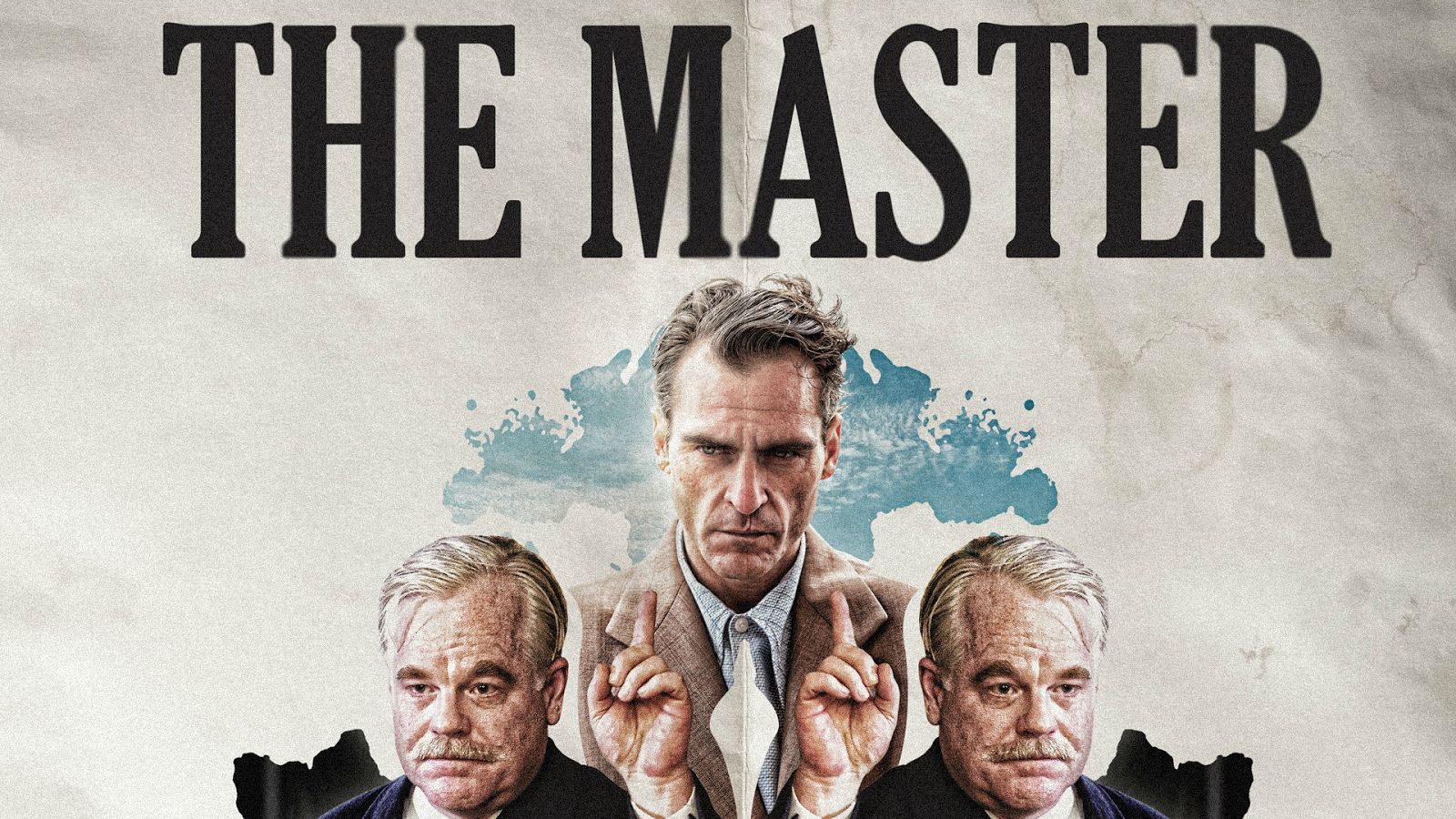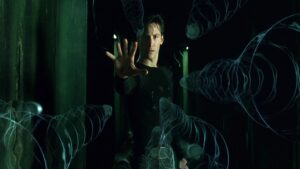Table of Contents
Introduction: Understanding the Complexities of “The Master”
In The Master, Paul Thomas Anderson masterfully explores the intricate relationship between mastery and submission, weaving a profound narrative that delves deep into human psychology. This film is not merely a portrayal of a man searching for purpose; it is a rich tapestry of emotional conflict and philosophical inquiry.
At its core, The Master raises essential questions about the nature of belief, the psychology of control, and the human yearning for connection. Through its complex characters and their dynamics, the film invites viewers to reflect on their own experiences and beliefs.
In The Master Explained, we will embark on a journey to unveil the depths of the human psyche as depicted in the film. From analyzing the character dynamics that define the story to examining the philosophical underpinnings of faith, we’ll dive into the myriad themes that make The Master a compelling study of the human condition.
The Psychology of Control: Analyzing Character Dynamics
The Mentor-Disciple Relationship
At the heart of The Master lies the complex relationship between Freddie Quell, played by Joaquin Phoenix, and Lancaster Dodd, portrayed by Philip Seymour Hoffman. This mentor-disciple dynamic serves as a lens through which the film explores the psychology of control. Freddie, a traumatized World War II veteran, is in desperate search of purpose and belonging. Dodd, the charismatic leader of a philosophical movement known as “The Cause,” embodies an alluring sense of authority and knowledge.
Freddie’s vulnerability makes him susceptible to Dodd’s influence, revealing how individuals can be drawn to figures who offer clarity amid chaos. The film illustrates this psychological phenomenon, showcasing how Dodd’s control over Freddie fluctuates, shifting from supportive guide to manipulative force. This interplay sheds light on the lengths individuals may go to attain mastery over others and how that control can root itself in a desire for connection.
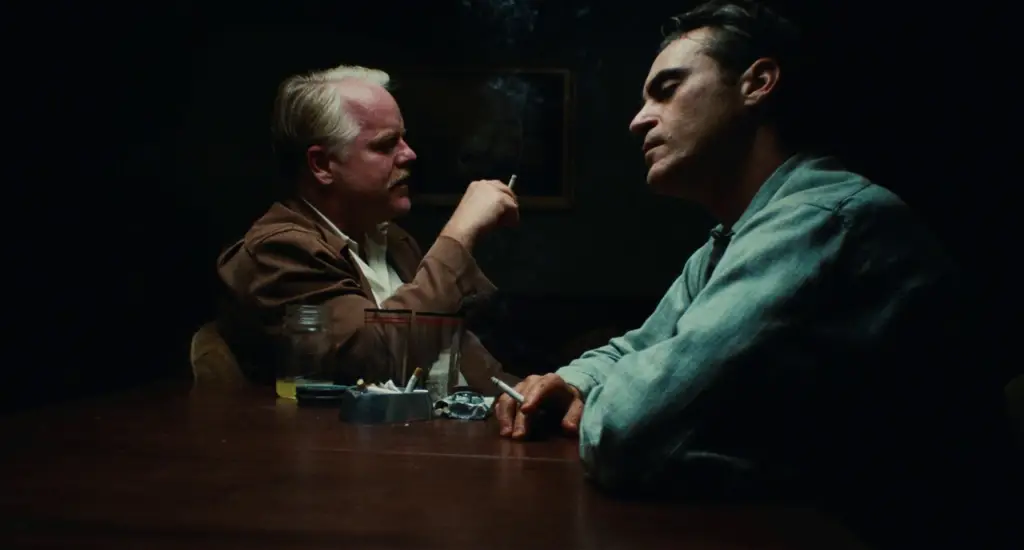
The Need for Validation
Another crucial aspect of character dynamics in The Master is the need for validation that drives both Freddie and Dodd. As the story unfolds, it becomes clear that both characters are seeking affirmation of their identities. Freddie grapples with feelings of worthlessness, searching for a figure he can trust and admire. Meanwhile, Dodd requires constant affirmation of his philosophies and a following that validates his sense of purpose.
This mutual dependency manifests in several tense interactions throughout the film. Dodd’s method of psychological control often involves testing Freddie’s loyalty and willingness to embrace the teachings of “The Cause.” In return, Freddie’s emotional volatility forces Dodd to confront his own insecurities and doubts. Their relationship reveals the fragility of power dynamics and the psychological toll of validation-seeking behavior.
The Role of Fear and Intimidation
Fear plays a significant role in the overall psychology of control depicted in The Master. Dodd utilizes fear as a tool for manipulation, employing intimidation tactics to maintain his authority over his followers, including Freddie. The film illustrates how fear can warp relationships, compelling individuals to conform to the will of those in power.
Freddie’s reactions to Dodd’s threats and the subsequent internal conflict he experiences highlight the emotional struggle faced by individuals caught in such dynamics. The constant push and pull between desire for connection and overwhelming fear creates a tense atmosphere, reflecting the darker side of human relationships. The Master allows viewers to grasp how power can be wielded—both as a means of connection and as a weapon of control.
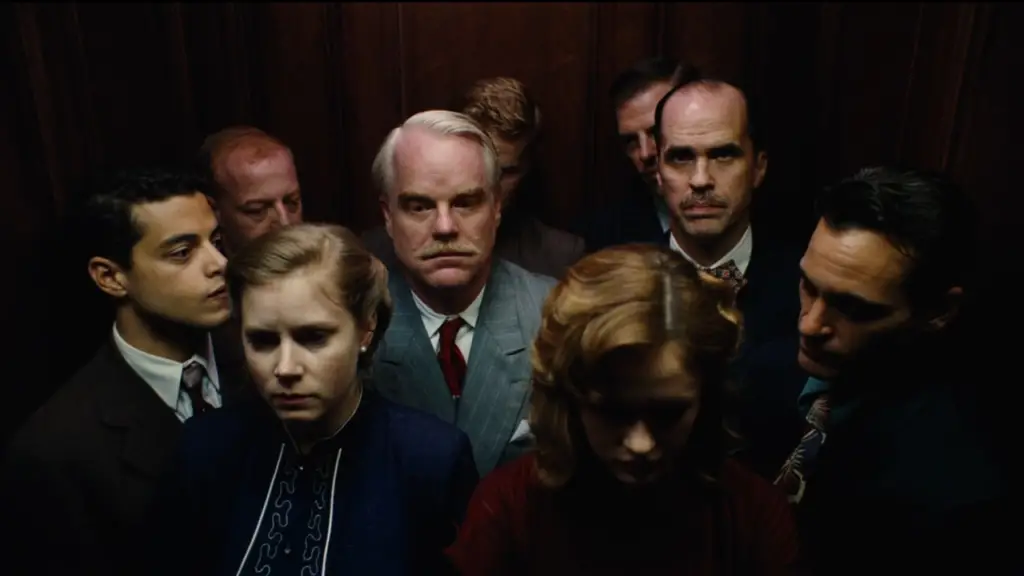
The Philosophy of Belief: Exploring Faith and Skepticism
The Nature of Faith
In The Master, the exploration of belief is central to understanding the characters’ motivations and the ideological framework of “The Cause.” Faith, in this context, is portrayed as both a source of strength and a potential weakness. Lancaster Dodd represents the archetype of a charismatic leader who cultivates a belief system that promises answers to life’s existential questions. His teachings draw followers like Freddie Quell, who are searching for purpose after trauma and chaos.
The film delves into the philosophical complexities of faith, questioning its validity and the implications of blind devotion. Dodd’s character embodies the allure of faith, offering a sense of belonging and movement toward enlightenment. Yet, the audience is challenged to consider the price of such faith—especially when it hinges on the unwavering loyalty that Dodd demands from his followers. This raises profound questions about whether faith can truly provide the solace it promises.
The Role of Skepticism
Contrasting with Dodd’s unwavering confidence is Freddie’s inherent skepticism. As a character shaped by trauma and chaos, Freddie embodies a more questioning attitude toward the world and the ideologies presented to him. His journey through the film illustrates the struggle between a desire for connection and a natural inclination to doubt authority.
Freddie’s skepticism serves as a critical lens through which the audience can examine the philosophies espoused by Dodd. As he wrestles with conflicting emotions and beliefs, viewers witness the tension between faith and skepticism play out on screen. This dynamic raises broader philosophical questions about the nature of belief itself: Can one truly accept faith without questioning its foundations? The Master offers a viewpoint on the necessity of skepticism in the face of compelling ideologies.
The Impact of Belief on Identity
Belief systems profoundly shape individual identities in The Master. As Freddie and other followers become increasingly absorbed in Dodd’s teachings, their personal identities begin to intertwine with the ethos of “The Cause.” The film explores how an individual’s self-conception can shift dramatically when entangled in a larger belief framework.
Freddie’s struggle to define himself apart from Dodd’s influence underscores the potential dangers of losing one’s identity in pursuit of belonging. The film raises crucial philosophical questions about autonomy and the existential implications of adhering to a belief system that may not align with one’s core values. This struggle reflects an essential aspect of the human experience, making the exploration of faith and skepticism in The Master particularly resonant.
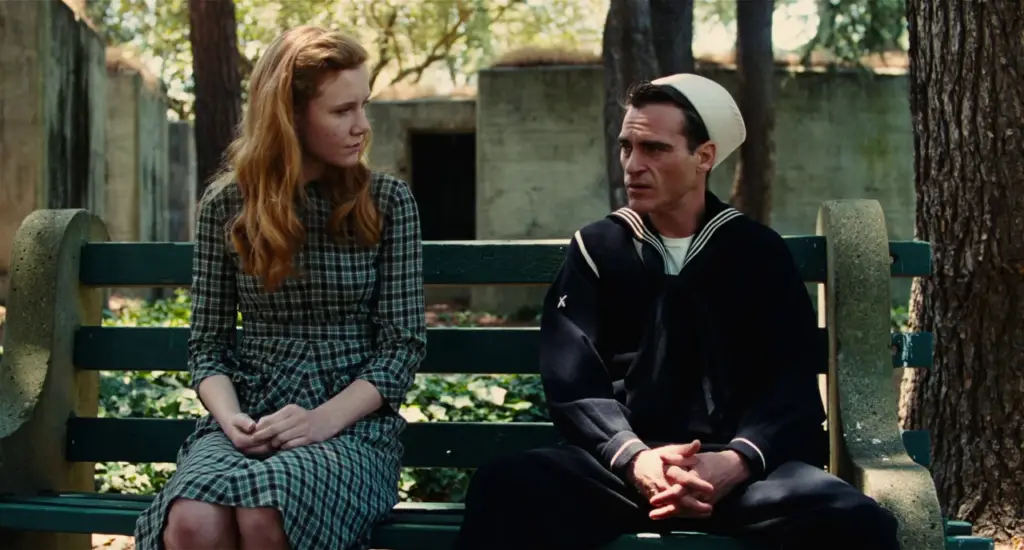
The Intersection of Trauma and Identity: A Psychological Perspective
The Impact of War Trauma
The Master presents a vivid portrayal of the psychological scars left by trauma, particularly through the character of Freddie Quell. A World War II veteran, Freddie exhibits classic symptoms of post-traumatic stress disorder (PTSD), which manifest in his erratic behavior and profound sense of disconnection from society. His experiences during the war have fundamentally altered his identity, leaving him grappling with his sense of self in a world that feels alien and hostile.
This trauma shapes Freddie’s interactions and relationships throughout the film. He oscillates between moments of vulnerability and aggression, reflecting the chaotic internal state that often characterizes those dealing with PTSD. The film explores how trauma can fracture identity, leading individuals to seek solace in the companionship of others, even when such relationships might be detrimental—like the one between Freddie and Dodd.
Identity Reconstruction Through Relationships
As the narrative progresses, Freddie’s relationship with Lancaster Dodd takes center stage in his quest for identity reconstruction. In Dodd, Freddie finds a paternal figure who offers a semblance of stability and purpose, albeit through a manipulative framework. This dependence on Dodd emphasizes the psychological principle that individuals struggling with trauma often seek out strong figures to help them navigate their existential crises.
Freddie’s transformation throughout the film illustrates how identity can be reconstructed, although often precariously, through relationships born from shared experiences and beliefs. However, as he becomes further entrenched in Dodd’s ideology, viewers witness the complexities of having one’s identity tied to another person. The psychological tension lies in the fact that while relationships can aid in healing, they can also serve as conduits for further trauma and loss of self-control.
The Search for Authenticity
Amidst the struggle between trauma and identity, The Master also highlights the quest for authenticity. Freddie’s journey is one of attempting to reconcile his fractured identity with the person he wants to become. The philosophical inquiries posed by Dodd, alongside the strict doctrines of “The Cause,” challenge Freddie’s innate sense of self.
As Freddie navigates through his emotional turmoil, he often questions not just Dodd’s teachings but also his own motivations and desires. This internal conflict accentuates the psychological trial of maintaining authenticity in the face of trauma, showing how the journey toward self-discovery can be riddled with obstacles. The Master articulates this complex interplay, underlining that the intersection of trauma and identity is a multifaceted process that greatly affects one’s search for genuine connection and self-affirmation.

Ending Explained: Unraveling the Final Moments
The Climactic Confrontation
The ending of The Master presents a powerful climax that encapsulates the emotional struggle between Freddie Quell and Lancaster Dodd. Their final confrontation is set against the backdrop of Dodd’s teachings and the growing tensions within “The Cause.” As Freddie’s psychological turmoil reaches its peak, the stakes become increasingly high for both characters.
In a pivotal scene, Freddie confronts Dodd about the authenticity of his beliefs and the manipulation he has endured. This moment marks a crucial turning point, as Freddie begins to assert his agency and question the very foundation of his relationship with Dodd. It’s a confrontation laden with psychological depth, signaling Freddie’s departure from blind faith towards a more authentic self-awareness. The intensity of this clash captures the essence of the film’s exploration of power dynamics and identity.
Ambiguity and Resolution
As the film approaches its conclusion, viewers are met with a sense of ambiguity that invites multiple interpretations. After a physically charged altercation, the relationship between Freddie and Dodd undergoes a subtle but significant transformation. Dodd’s authority crumbles, revealing the fragile nature of the beliefs he has constructed. In the aftermath, Freddie’s journey becomes less about finding belonging within “The Cause” and more about the complexity of self-acceptance.
The film’s final scenes hint at Freddie’s struggle to reconcile his trauma with his desire for connection. He finds himself in a state of introspection, surrounded by a world that feels both familiar and alien. The final moments leave audiences grappling with Freddie’s unresolved identity, as he steps away from Dodd yet remains tethered to the memories and lessons learned. The Master emphasizes the idea that finding oneself after trauma is often an incomplete process, filled with lingering questions.
The Symbolism of Freedom
The ending also contains rich symbolism related to the theme of freedom. In the film’s closing scenes, Freddie is depicted engaging in an act of sexual intimacy, a moment implying a tentative step toward reclaiming his body and identity. This act can be interpreted as a small yet significant victory over the control that Dodd and his ideology exerted over him.
However, the ambiguity of Freddie’s future underscores that true freedom may not reside solely in physical encounters but in the difficult journey of self-exploration and acceptance. By the end, viewers are left contemplating whether he will continue to pursue an authentic life or if the shadows of his past will continue to influence his decisions. This duality resonates deeply with the film’s central themes, illustrating the complexities of trauma, identity, and the quest for personal liberation.
Visual and Narrative Techniques: Aesthetic Choices in “The Master”
Cinematic Composition and Framing
The Master is renowned for its breathtaking visuals, and the cinematography by Mihai Malaimare Jr. plays an essential role in conveying the film’s psychological and emotional depth. The use of 65mm film creates a sweeping, immersive experience that captures the nuances of the characters and their environment. Extended shots and meticulously framed compositions allow viewers to linger on critical moments, reinforcing the weight of emotional exchanges between Freddie and Dodd.
The framing often emphasizes isolation, with characters placed against vast, empty backgrounds. This technique reflects the internal struggles of the protagonists, particularly Freddie, as he grapples with feelings of abandonment and dislocation. By using wide shots to illustrate their emotional distance, Anderson effectively encapsulates the psychological themes of longing and control while inviting audiences to reflect on the broader implications of each scene.
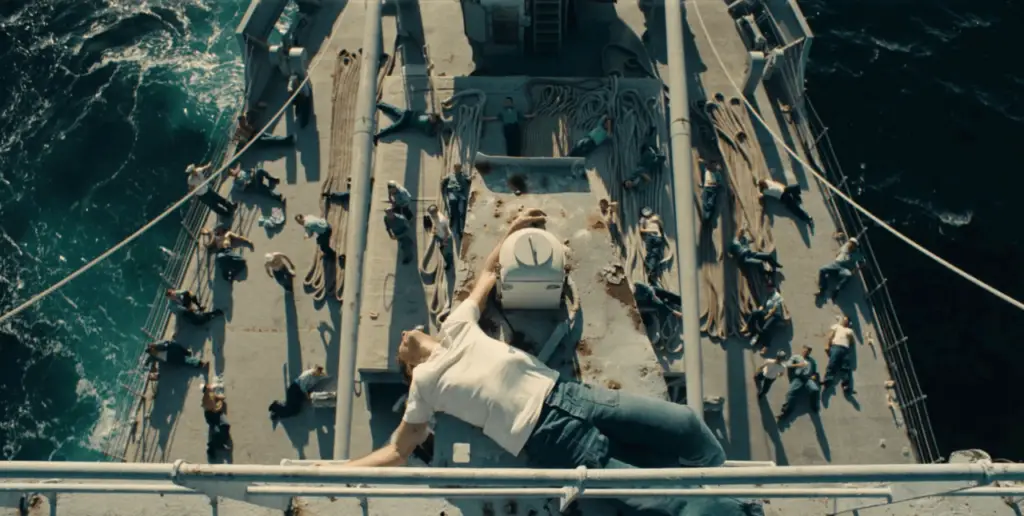
Color Palette and Symbolism
The color palette in The Master is another significant aesthetic choice that enhances the film’s thematic elements. Earthy tones—rich browns, deep greens, and muted blues—create a somber atmosphere that resonates with the characters’ emotional states. This deliberate choice of colors invokes a sense of realism while simultaneously emphasizing the oppressive weight of trauma and the search for identity.
Light and shadow also play crucial roles in the film’s aesthetic. Shadows often underscore moments of tension and manipulation, particularly in scenes involving Dodd and his followers. Conversely, well-lit spaces can signify moments of clarity and revelation for Freddie, suggesting a struggle between the darkness of his past and the potential for transformation. The Master reveals how color and lighting collectively contribute to the film’s exploration of psychological depth, adding layers of meaning to the narrative.
Narrative Structure and Pacing
The narrative structure of The Master is uniquely non-linear, employing a series of fragmented scenes that mirror Freddie’s psychological instability. This pacing encourages viewers to engage actively with the unfolding trauma and disorientation experienced by the protagonist. The fragmented storytelling represents the disjointed nature of Freddie’s identity as he navigates his corrosive relationship with Dodd and the cult-like environment of “The Cause.”
Additionally, the use of dreamlike sequences blurs the line between reality and hallucination, inviting audiences to delve deeper into Freddie’s psyche. These surreal moments reinforce the film’s exploration of mental states, creating an unsettling yet engrossing experience. The Master highlights how this innovative narrative technique complements the psychological themes central to the film, allowing for a more profound exploration of its characters and their journeys.
Recommended Reading: Books that Mirror “The Master”‘s Themes
The Master explores complex themes of trauma, identity, control, and belief systems. For those intrigued by these concepts, the following books provide in-depth insights and mirror the film’s psychological and philosophical underpinnings.
One of the seminal works on the human psyche, Man’s Search for Meaning by Viktor E. Frankl offers a profound exploration of finding purpose even amid suffering. Frankl’s experiences as a Holocaust survivor led him to develop logotherapy, emphasizing the search for meaning as the primary motivation in human life. The themes of existential inquiry resonate deeply with Freddie’s struggle for identity and belonging.
Buy Man’s Search for Meaning here
The Catcher in the Rye by J.D. Salinger delves into the psyche of its protagonist, Holden Caulfield, who grapples with feelings of alienation and confusion. Much like Freddie Quell, Holden embodies a struggle against societal norms and the quest for authentic connection amidst chaos. This classic novel invites readers to reflect on the complexities of adolescence and identity.
Buy The Catcher in the Rye here
In The Road Less Traveled, M. Scott Peck offers insights into the nature of love, personal growth, and the journey toward self-acceptance. Peck emphasizes that true fulfillment comes from recognizing and confronting our challenges, paralleling Freddie’s transformation as he navigates his tumultuous relationship with Dodd and the impact of trauma on his identity.
Buy The Road Less Traveled here
The Sociopath Next Door by Martha Stout presents an exploration of how sociopathy manifests in everyday life and its impact on relationships. Stout’s investigation into manipulation and psychological control sheds light on Dodd’s character and his influence over Freddie and others, offering readers a lens through which to understand the darker aspects of human behavior.
Buy The Sociopath Next Door here
Finally, Escape from Freedom by Erich Fromm provides a critical examination of the psychological mechanisms that underlie human behavior in the context of freedom and social structures. Through this exploration, Fromm discusses the tension between individuality and the desire for belonging, themes that resonate with both Dodd’s manipulation and Freddie’s quest for identity.
Buy Escape from Freedom here
Conclusion: Reflecting on the Journey Through “The Master”
In exploring the intricate layers of The Master, we have delved into the psychological and philosophical themes that define the film. The dynamics of control, the exploration of belief, and the intersection of trauma and identity all contribute to a rich tapestry that invites deep reflection. Through the characters of Freddie Quell and Lancaster Dodd, The Master allows us to confront our own perceptions of power, faith, and selfhood.
As we unpack the narrative techniques and visual aesthetics, it becomes clear that Anderson’s work transcends mere storytelling, creating a profound commentary on the human experience. The Master explained serves not only as an examination of trauma and identity but also as a mirror reflecting our struggles with connection and understanding in a complex world.
Ultimately, The Master challenges us to consider what it means to seek purpose and belonging amidst the labyrinth of our minds. The journey through its themes encourages ongoing exploration and introspection, making it a film that resonates long after the credits roll.
Take a look at all our in-depth reviews here.

